All on 4 Failure
Are you considering an All on 4 Implant Denture? Wondering what are the possible complications that could occur from an All on 4 procedure? Let our Board Certified Surgeon of over 10 years, inform you today. Although rare, an All on 4 surgery can have complications when not properly performed. These complications could result from many factors, which could contribute to implant failure. Choosing the correct surgeon and following your post-operative instructions closely are important to avoid any of these complications.
Surgical Complications During an All on 4 Surgery
An All on 4 surgical procedure is a very extensive treatment. Due to this, it is best to put your treatment in the hands of a board-certified specialist who is well versed in IV sedation. IV sedation not only gives the patient a more comfortable procedure but gives the surgeon peace of mind for you to have the procedure done without you experiencing pain and also allows the surgeon to have quick access to administer any medications, especially if a patient has any medical conditions. Other risks during surgery consist of excessive bleeding, nerve damage, or sinus issues. All of these risks can be prevented by the use of a 3D scan to help the surgeon properly plan the surgery. The 3D image allows the specialist to locate all the nerves, potential arteries, and sinus cavities in your jaws. For example, the patient shown below came in for an All on 4 consultation. Upon examination of the Panoramic image, nothing seemed out of the ordinary. However, upon inspection of the 3D scan, a horizontal impacted canine was discovered. If the treatment would have been completed with just the Pano and no 3D Ct Image, complications may have arised. The implants could have penetrated the tooth instead of solid bone and the treatment would’ve had to change drastically. Surprises in treatment should always be avoided, to ensure the best result possible for the patient. Having this technology is imperative to ensure a safe treatment.
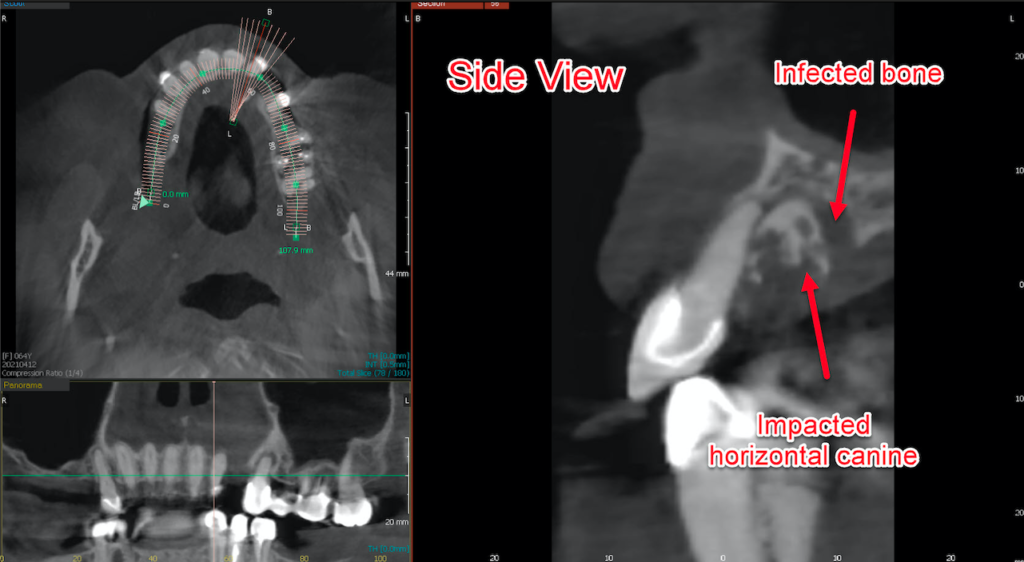
All on 4 Dental Implant Risks
During surgery, the main complication that could occur would be implant instability. This may occur if the surgeon is placing the implant into the bone and can’t attain an adequate amount of stability. The stability of the implant means that the implant needs to attain a certain “grip” or “tightness” in the bone of at least 35 Newtons/cm2 of torque upon implant insertion. Not having this type of retention can lead to implant failure if the prosthesis (your fake teeth) are placed on the implants during the surgery. Just think, would you hang a 200-pound painting with a few screws placed in drywall or would you want to ensure the screws were placed in the studs. It is important to have the necessary stability. Implant instability occurs because there isn’t enough quantity or quality of bone. The quantity of bone can be influenced by genetics and also be affected if you have been missing teeth in the area for a while. The quality of the bone refers to the bone density. Factors that contribute to weak bone density can include age, race, and even diseases such as osteoporosis and the use of certain medications.
If implant stability is lacking (below 35 Newton/cm2), then attaching the prosthesis to the implants will lead to implant failure. There is another solution that will not lead to implant failure. It involves letting the implants heal undisturbed for at least 4 months to allow the implants to properly integrate into the bone. However, this would involve wearing a regular denture during this healing time, which can be very frustrating wearing a very loose-fitting denture. Although this can be very frustrating for the patient, the implants must be osseointegrated with the bone, creating a firm foundation. This foundation is very important to ensure the overall longevity of your all on 4. However, if no issues arise with the implants within the first 4 months following treatment, a majority of the time none will arise in the future. If the implants are properly taken care of with proper home hygiene and regular in-office cleanings and non-smoking, the implants can last a lifetime. For example, the patient shown in the photos below had her implant dentures placed in another state 10 years prior. The patient had never returned for her in-office cleanings. Due to this, the patient experienced severe implantitis, due to an infection from bacterial build-up. In-office cleanings are imperative to ensure the longevity of your implant dentures.
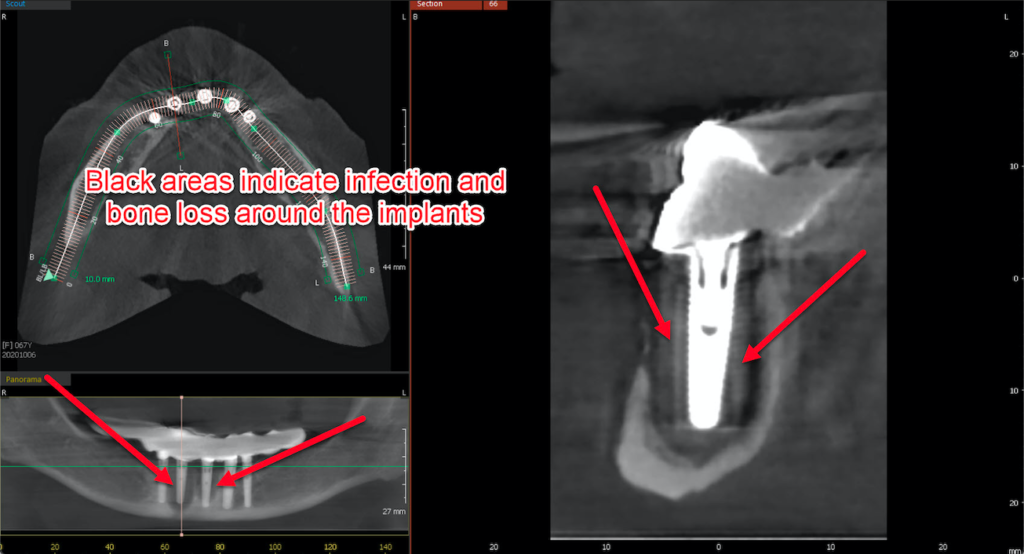
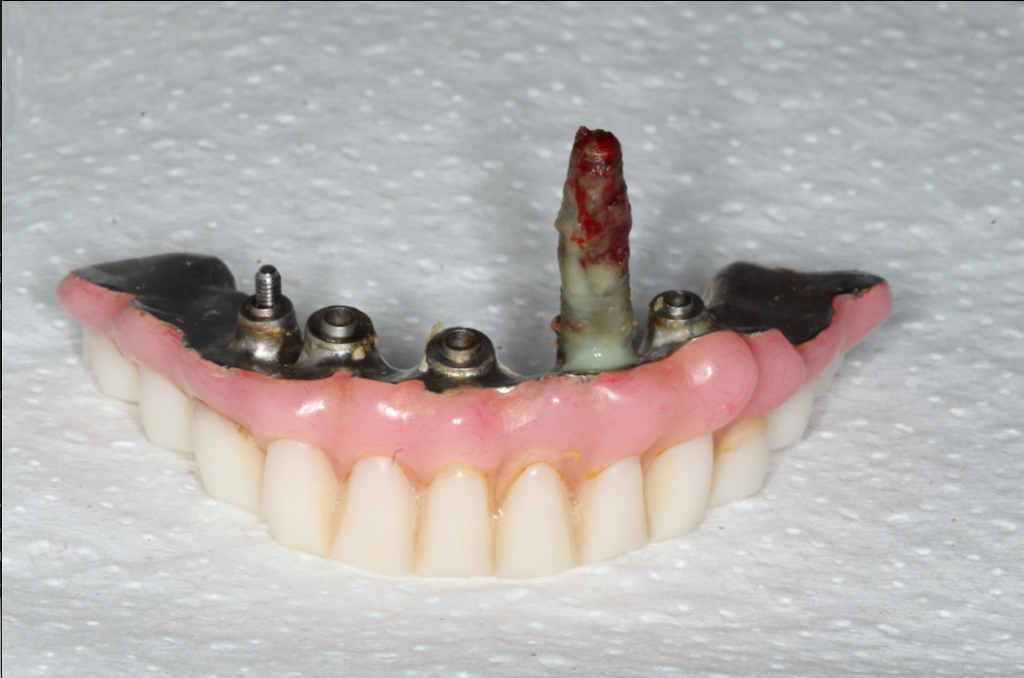
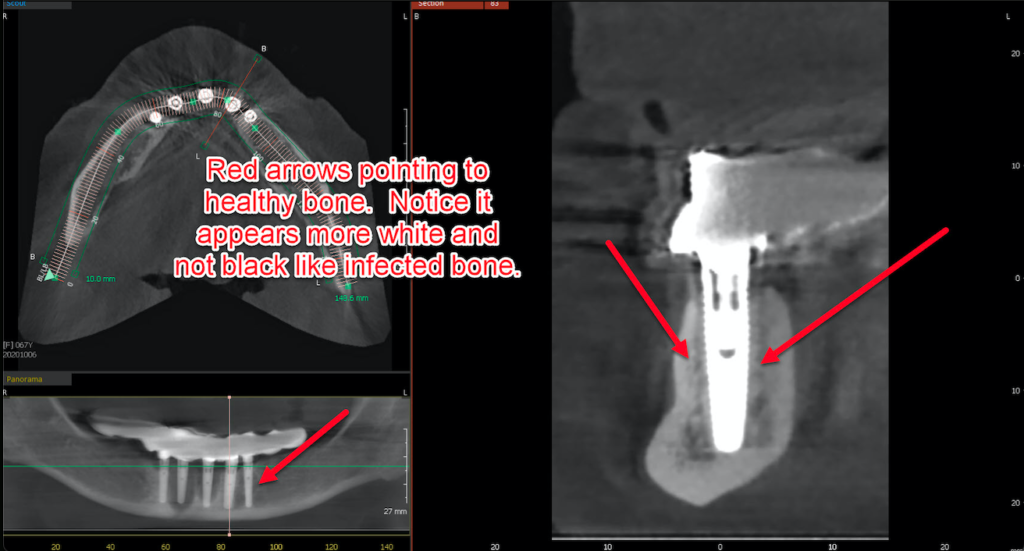
Prosthetic Complications of an All on 4
Prosthetic issues can not only be inconvenient for the patient but cause implant failure. Overloading any single implant can cause bone loss and prosthetic failure. Implants need enough anterior-posterior spread, commonly referred to as A-P spread. Not having this space can not only put too much force on an implant but can cause a cantilever effect. This effect results in the prosthetic denture breaking easily. Other prosthetic issues may consist of teeth breaking, denture breaking, and staining. All of these complications are common in acrylic or titanium bar prosthetic dentures which may be used as temporary or final dentures.
Another common issue is spacing. When there is too much space between the top of the denture and the gums, food can get trapped in this space. Trapped debris can lead to infection and gum irritation. This space can be avoided by assuring the gums and bone have healed for a long enough time after your surgery. Following treatment, it takes at least 4-6 months for the gums and bone to stop recontouring shape. Final dentures fabricated too soon can lead to this spacing issue.
Acrylic Staining
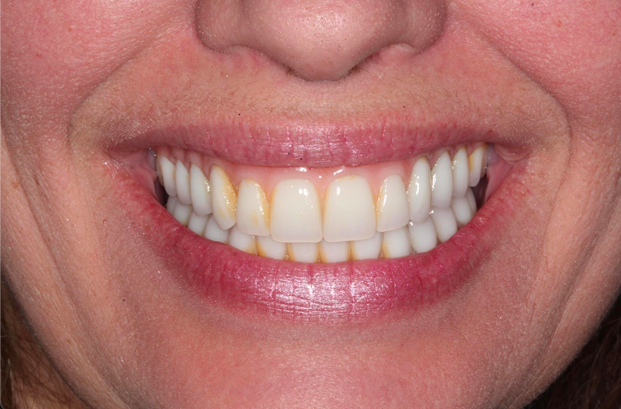
Finally, if the surgeon did not properly angle the multi-unit abutments it can lead to speech impediment and discomfort due to too much bulk of the prosthesis. This improper angulation causes the prosthesis to feel bulky in the patient’s mouth along the tongue side or around the mouth. For ideal bulk reduction, the abutments will be placed along the bite line to ensure proper denture thickness.
Limited Prosthetic Bulk
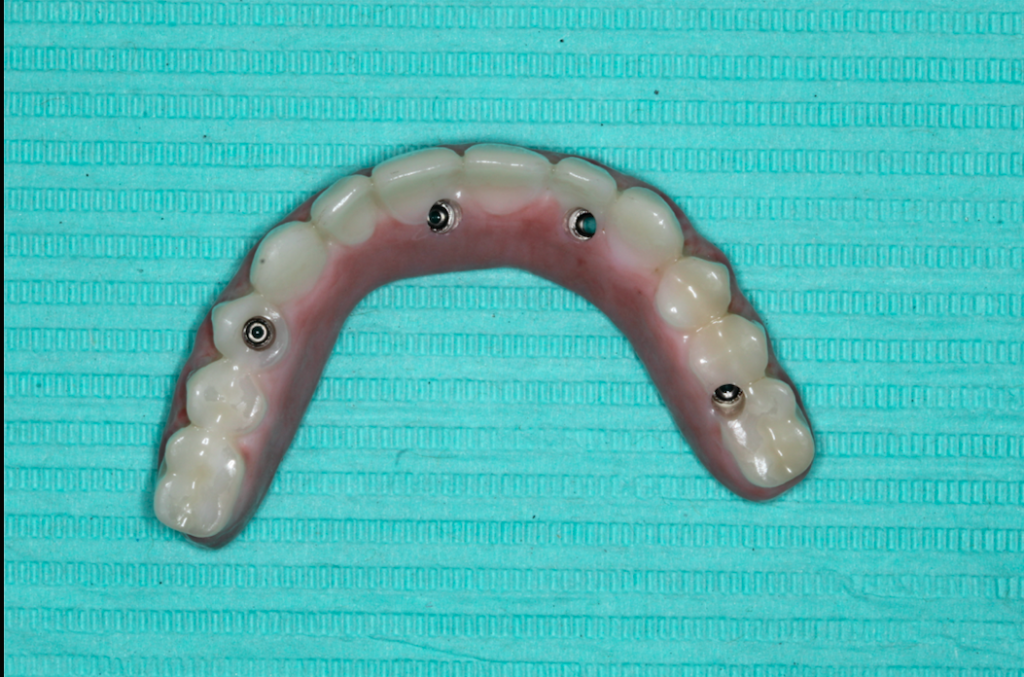
Choosing the right surgical specialist is imperative to aid in avoiding any All on 4 complications. Asking the right questions helps this process too. Ask your surgeon about the experience and materials used to make the prosthesis. Ask about the timeline between the temporary and the final prosthesis. Find out their success rate of placing implants. All of these questions will aid you in making the proper decision for your All on 4 Implant Denture future.









